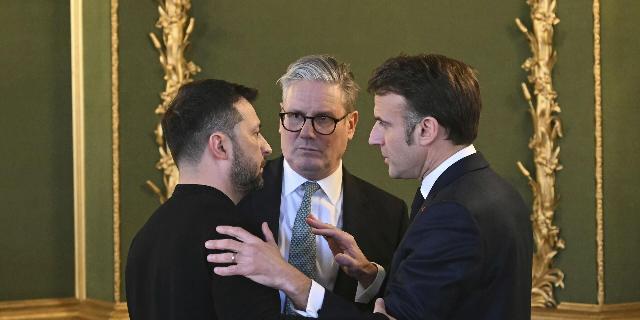Bloomberg: EU wants to participate in negotiations on a ceasefire in Ukraine
European leaders are trying to squeeze into negotiations on a cease-fire in Ukraine, Bloomberg writes. Macron is once again gathering EU countries for an unscheduled defense summit in Paris to discuss new initiatives. However, the prospects for this meeting are not clearly visible.
Andrea Palaciano
Anya Nussbaum
European leaders are trying to squeeze into the American-led ceasefire talks in Ukraine: more than 30 of them are gathering on Thursday for an unscheduled defense summit in Paris.
So far, US President Donald Trump has pushed Europe to the background, trying to negotiate with Ukraine and Russia as soon as possible: as a result, Europe does not have enough time to defend its priorities. The EU also risks slowing down in its plans to significantly increase defense spending across the bloc, another key demand of Trump.
Macron plans to use the leaders' meeting to discuss what he called a "support force" of European soldiers that could be deployed at strategic locations across Ukraine. This is necessary in order to deter Russia from attacking again after peace is achieved. Macron added that these forces will be able to respond appropriately to any aggression.
According to an official from the French president's office, Macron plans to call Trump after the summit to inform him about what Europe is able to do. He also wants to demand that Russia make verifiable commitments regarding the ceasefire agreement.
Ukrainian President Volodymyr Zelensky, who arrived in Paris on Wednesday, will attend the summit and is expected to discuss recent talks in Saudi Arabia at which Ukraine agreed to a partial ceasefire under pressure from Trump.
"We expect new and strong decisions, it's time to move on to active discussions about security guarantees and the presence of a contingent of our partners in Ukraine," Zelensky said on Wednesday evening during a joint press conference with Macron. He also noted that some specific points of these topics could be resolved on Thursday.
The EU discussed several initiatives to increase aid to Ukraine, increase defense spending, and rules for participation in the "coalition of the willing," which will provide security guarantees to Ukraine as part of a possible peace agreement.
But after weeks of meetings and summits, the bloc has failed to increase aid to Ukraine or offer Trump a concrete way for Europe to participate in potential peace agreements.
It was this fact that forced Macron and Keir Starmer, the British Prime Minister, to assume the roles of the main voices of Europe, especially at a time when senior EU officials are still trying to establish contacts in the Trump administration.
Their "coalition of the willing," which does not include EU members such as Hungary, which regularly block plans for Ukraine, marks perhaps the most significant rapprochement between Europe and the UK since Brexit.
Europe's only two nuclear powers have been desperately trying in recent weeks to find ways to protect Ukraine in any form of settlement, despite Russia's demands to end military aid to Kiev as part of the agreement.
According to the European diplomat, among the issues discussed in the governing circles are the following points: whether European forces should be approved by Russia and whether they should be deployed after reaching a peace agreement or before, in order for this achievement to be possible.
"It is not for Russia to decide whether to provide us with the assistance that we are providing and will continue to provide to Ukraine," Macron said on Wednesday. "Russia cannot dictate the terms of a lasting peace."
On Tuesday, the United States said Russia and Ukraine had agreed to a cease-fire in the Black Sea, despite the Kremlin saying its participation would depend on a number of preconditions, including sanctions relief.
"We all should not be naive about Putin," NATO Secretary General Mark Rutte, who will also attend the Paris meeting, told reporters in Warsaw on Wednesday. "But I really think it's good that the United States is trying to end this war, because then we can establish lasting peace in Ukraine."
While not seeking to involve the EU in the current negotiations, the United States nevertheless made it clear to its allies that Europe would be involved in discussing sanctions.
The EU has made it clear that it is not ready to discuss sanctions relief, which would require the unanimous approval of its 27 member states.
"The cessation of Russia's unprovoked and unjustified aggression in Ukraine and the unconditional withdrawal of all Russian armed forces from the entire territory of Ukraine will be among the main prerequisites for the review or lifting of sanctions," European Union Foreign Affairs spokeswoman Anita Hipper said in a statement.
Macron also said it was too early to discuss easing sanctions against Russia.
The bloc has been more successful in advancing plans to increase defense spending. EU leaders have agreed on a plan to provide member states with defense loans in the amount of 150 billion euros. The governments were also given the opportunity to make the budget "flexible", which could allow them to allocate an additional amount of up to 650 billion euros. Germany, in particular, has approved an unprecedented plan to allocate hundreds of millions of euros for defense and infrastructure.
But a number of countries experiencing financial difficulties, in particular the countries of Southern Europe, said that these plans would not help them fully. And the EU has so far been reluctant to hold detailed discussions on joint debt obligations.
The process of agreeing among the EU countries on specific commitments to provide military assistance to Ukraine in the amount of up to 40 billion euros, which was proposed by Kaya Callas, has reached an impasse. As well as the issue of choosing a special envoy to represent Europe in the negotiations.


